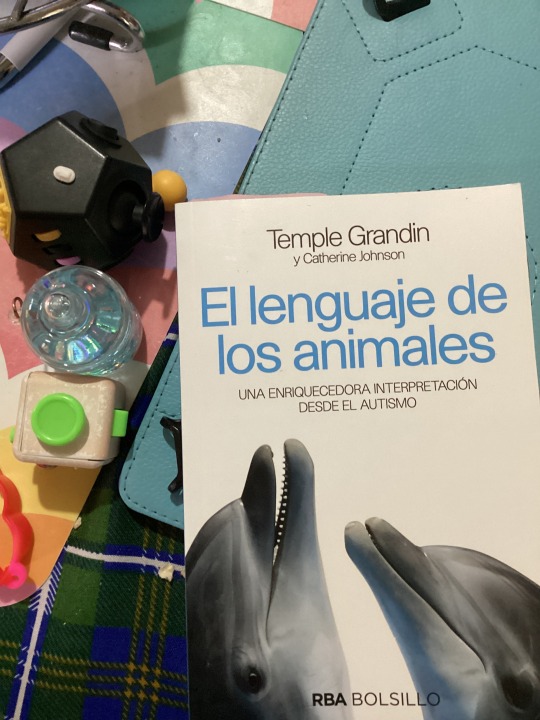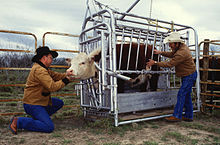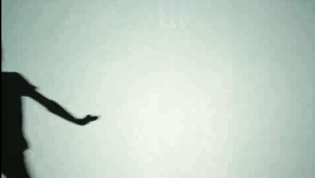#temple grandin
Text
This was the case with the B.s, the autistic family I had visited in California—the older son, like the parents, with Asperger’s syndrome, the younger with classical autism. When I first arrived at their house, the whole atmosphere was so “normal” that I wondered if I had been misinformed, or if I had not, perhaps, ended up at the wrong house, for there was nothing obviously “autistic” about them or it. It was only after I had settled down that I noticed the well-used trampoline, where the whole family, at times, likes to jump and flap their arms; the huge library of science fiction; the strange cartoons pinned to the bathroom wall; and the ludicrously explicit directions, pinned up in the kitchen, for cooking, laying the table, and washing up—suggesting that these had to be performed in a fixed, formulaic way (this, I learned later, was an autistic in-joke). Mrs. B. spoke of herself, at one point, as “bordering on normality,” but then made clear what such “bordering” meant: “We know the rules and conventions of the ‘normal,’ but there is no actual transit. You act normal, you learn the rules, and obey them, but . . .”
“You learn to ape human behavior,” her husband interpolated. “I still don’t understand what’s behind the social conventions. You observe the front—but . . .”
The B.s, then, had learned a front of normality, which was necessary, given their professional lives, their living in the suburbs and driving a car, their having a son in regular school, etc. But they had no illusions about themselves. They recognized their own autism, and they had recognized each other’s, at college, with a sense of such affinity and delight that it was inevitable they would marry. “It was as if we had known each other for a million years,” Mrs. B. said. While they were well aware of many of the problems of their autism, they had a respect for their differentness, even a pride. Indeed, in some autistic people this sense of radical and ineradicable differentness is so profound as to lead them to regard themselves, half-jokingly, almost as members of another species (“They beamed us down on the transporter together,” as the B.s liked to say), and to feel that autism, while it may be seen as a medical condition, and pathologized as a syndrome, must also be seen as a whole mode of being, a deeply different mode or identity, one that needs to be conscious (and proud) of itself.
— An Anthropologist on Mars (Oliver Sacks, 1993)
#oliver sacks#temple grandin#an anthropologist on mars#psychology#autism#disability#marriage#family#children#parenting#stimming
7K notes
·
View notes
Text
Why Temple Grandin is NOT my Hero
Hello everyone,
As the title says, I wanted to talk about Temple Grandin. I got to meet her when I was 12. She seemed very standoffish (which isn’t surprising). I did some research on her for some time and I’ve come to realize that she isn’t the best autism advocate. According to this article:
As a believer in functioning labels, Temple Grandin believes in preserving “high functioning” autistic traits while eliminating “low functioning” traits through Applied Behavioral Analysis (ABA) and cures and even special diets for autism, such as wheat free and dairy free. ABA is a harmful early intervention that causes PTSD in autistic adults and attempts to eliminate autistic behaviors and replace them with neurotypical behaviors, which causes distress and emotional and psychological harm in autistic children and adults who undergo ABA. The Association for Applied Behavioral Analysis (ABAI) even endorsed electric shock therapy at the Judge Rotenberg Center, the only care facility in the United States to use this horrific form of “treatment.” The fact that Temple Grandin divides autistic people into those that should be “preserved” and those that should be “cured” is a very harmful and ableist belief, and this view is damaging to the pro-acceptance and neurodiversity movement.
Article will be below:
Clearly she supports ABA therapy, which is harmful to autistic people. Plus she also mentions how she thinks autism can improve in time. Which…isn’t how it works. You can manage your traits and symptoms, but you can’t necessarily “improve”. Your autism is your autism. It’s not going to change.
While she did do some good work for the world, I cannot bring myself to support her advocacy. If you aren’t advocating for all autistic people, higher needs included, then you aren’t advocating for us at all.
Some autistic people have high support needs. And she doesn’t seem to understand that, and thinks it can magically improve is the gist I’m getting here. That’s not how it works. You don’t “improve” an autistic individual. You “support” them. No matter where they are on the spectrum.
According to another article I found:
Temple Grandin believes that "high-functioning" autistics are talented, intelligent, and necessary to human survival, while "low-functioning" autistics cannot function or live independently, and thus should be cured in the present and prevented from existing in the future. Both I and others have thoroughly deconstructed the false dichotomy of high and low functioning, but suffice it to say that such claims not only reinforce ableist hegemony, but also reinforce a capitalist notion of success and value in that only people who can produce are worthy of inclusion in society; all others are burdens.
That’s all I wanted to share. I will leave the source below if anyone wants to read it. I find this very disappointing because I looked up to her when I was younger.
#autism#actually autistic#temple grandin#tw aba therapy#tw aba mention#why I can’t support her#autism advocacy#feel free to share/reblog
139 notes
·
View notes
Text

[ID: a photo of the children's book "the girl who thought in pictures: the story of dr. temple grandin." the book is green and features an illustration of a light-skinned girl with brown, curly hair. various pictures float around her head, connected to her by dashed lines: two diagrams, a blue ribbon, a mooing cow, a rocket ship, someone riding a rearing horse, and a cow in a restraint device.]
This is the cutest kids' book We've seen in some time!! Temple Grandin is a personal hero (openly autistic, a woman in animal science, and a great speaker) so I was delighted by this book.
The Girl who Thought in Pictures: the Story of Dr. Temple Grandin by Julia Finley Mosca
20 notes
·
View notes
Text
Big fan of female biologists who write books about trees that are basically just love letters to nature. They exude love and hope in a way that appeals to me in the deepest parts of my soul
#my heart is coated in moss#its what makes it a soft place to lay your head#text#text post#bookblr#booktok#personal#robin wall kimmerer#temple grandin#lyanda lynn haupt#michelle dowd#sy montgomery#it's a very specific niche#but I love it with my entire being#nature
16 notes
·
View notes
Text
The Temple Grandin movie
(This is an edit I made)
I’m a vet med student in Chile. Here we study animal care in general, and only specialize in the last years. I have to explain this, so it makes sense. At my first semester one of the classes I took was “Medical Physics”, which was actually just normal physics, but with some vet examples in between. It was in this class that one assignment was to watch this movie. And then the next exam had questions about it. And no, it wasn’t extra points, it was half the exam! I still remember one of the questions was why she had to create the squeeze machine. And some about animal welfare.
I really liked this movie, despite being unsure since when the professor was talking about it he kept saying “Aspergers”, and I was scared of how my classmates would react to it. I also wondered if they would make the connection that the person they were seeing in the screen was similar to me. Didn’t happen, but it was good to see it had good reactions. Yes, there was the occasional ableist comment, and the ones who didn’t even watch it and were judging it. But mostly good, some even cried (me too).
After the exam, I decided to re-watch it, this time without pressure. I did see myself in her, so much that it is one of my comfort movies now (that’s why I made an edit). I do think it’s good representation, I got to this conclusion after reading everything I could find on the process and how much the real Temple Grandin was involved. Before this movie, I’ve never heard of her, so she became a bit like my idol at this time, since I found it similar to what I study.

I’d like to see more autistic women in the field, working with animals, like me in the future. And more good representation! Please
#actually autistic#autism#neurodivergent#disability#special interest#temple grandin#representation#autistic#female autism#veterinary medicine
9 notes
·
View notes
Text

This film managed, at different parts of my life, to both convince me that I wasn't, and that I was, autistic.
Last time I watched it I cried, a lot, in a lot of places.
Once the assessment process is over, if I get a diagnosis, I'm gonna watch it again, and probably cry a lot more.

Also I needed this dude through my schooling. Even watching this helped me?? because then I knew there were people out there who could know you weren't normal and still help you anyway.

Anyway I was just thinking about this film and trying to find if anyone's giffed the 'are you a scientist?' line because I need it so often. 'hellomynameistemplegrandin ARE YOU A SCIENTIST??'

12 notes
·
View notes
Text
Feeling very Temple Grandin in need of a hug machine today

Talk about a niche post

23 notes
·
View notes
Text
dr temple grandin has some wack beliefs and opinions and i definitely don’t think she should be as prominent a voice in autistic spaces as she is currently, but one positive thing about her that can always be reliably counted on is that she will Always serve. she has one look and it will never change and i am so obsessed with it.
#temple grandin#she definitely deserves to be a leading voice in agricultural research though for sure
23 notes
·
View notes
Text

2 notes
·
View notes
Text

Temple Grandin by Allison Adams
Mary Temple Grandin (born 1947) is an American professor of animal science at Colorado State University, consultant to the livestock industry on animal behavior, and autism spokesperson. She is one of the first individuals on the autism spectrum to publicly share insights from her personal experience of autism. She invented the "hug box" device to calm those on the autism spectrum. In the 2010 Time 100, an annual list of the 100 most influential people in the world, she was named in the "Heroes" category.
#temple grandin#Allison adams#art#artwork#portrait#female portrait#women#woman#autistic women#animal activists#irl women/girls#autism
3 notes
·
View notes
Text
Finally watched the Temple Grandin movie and I've never felt so seen. I was like: "I do that", "I do that too" the whole time. The first scene with the cows freaked me out so much I had to stim for the rest of the movie. And while I'm not 100% like her (I've started calling it "silent autism"), it was great to see someone as strong headed as me fighting for what they want and even achieving it.
BTW, I'm claustrophobic and I don't know if I'd like the squeeze machine, but I love hugs so who knows.
#temple grandin#autism#neurodivergent#like the struggle is real#i also think in images too#and now I know why automatic sliding doors freak me out a little
4 notes
·
View notes
Text
I (Ariel) recently listened to the audiobook version of Animals in Translation: Using the Mysteries of Autism to Decode Animal Behavior by Temple Grandin and Catherine Johnson. It really shone a light on how far we’ve come both in our understanding of neurodiversity and the language we use to talk about it; it also caused me to realize how very little I actually know about animal behaviour. It’s free to read over on our Patreon; I’d really like you to go take a look!
#solarpunk presents podcast#solarpunk#neurodiversity#temple grandin#autism#animals#animal ethics#book review#neuroscience#animal rights
5 notes
·
View notes
Text

#HappyBirthday #catherineohara #actress #beetlejuice #homealone #lostinnewyork #nightmarebeforechristmas #shittscreek #secondcitytv #survivingchristmas #penelope #frankenweenie #lemonysnicketsaseriesofunfortunateevents #templegrandin #wyattearp #homefries #dicktracy #argylle
#happybirthday#catherine o'hara#actress#beetlejuice#home alone#lostinnewyork#nightmare before christmas#shittscreek#secondcitytv#surviving christmas#penelope#killers#frankenweenie#lemonysnicketsaseriesofunfortunateevents#temple grandin#wyatt earp#home fries#dick tracy#argylle
6 notes
·
View notes
Note
Temple Grandin is very controversial among the autustic community. While I appreciate how much she has done for the AG industry she's said things like we should prevent people who are "more effected" by autism from being born. She also promotes ABS. She was ahead of her time in advocacy when she originally rose to prominance but now she's seen as extremely regressive.
Ah, that’s unfortunate. I’m only really familiar with her work in animal welfare.
13 notes
·
View notes
Text
The leading figures of neurodiversity are Grandin, Robison, Silberman, Baron-Cohen, and Atwood. All of them are 65 or older, so adherents of the movement will have to consider, "Where do we go from here?"
While one might want to hope that one group keeps the name while abandoning the cultic teaching, like what happened after the death of Herbert W. Armstrong, but most Armstrongists broke fellowship with this reformist faction led by Tkach and continued promoting Armstrongist doctrine.
On the other hand, one might envision a scenario where the group remains, and its teachings do not change substantially, but its numbers and influence wane, like what happened after the death of Mary Baker Eddy. While the disease denialism certainly paints the picture of the neurodiversity movement consisting of Eddy's spiritual descendants, her group was way too small and centralized and she did basically everything possible to avoid splintering.
One might anticipate something similar to the aftermath of Joseph Smith, CT Russell, or Ahn Sahng-hong, where two major groups emerge, or one major group amidst a flurry of smaller groups emerge, each swearing on their life they are promoting their founders' actual teaching. However, again, these movement were way more centralized than the neurodiversity movement.
The best comparison is likely what happened in the years after the deaths of Alexander Campbell and Barton Stone. They engineered a movement that was decentralized by design, so there were several different figures all insisting the others were promoting false ideas. A few major groups have arisen, some more decentralized than others, but their movement is still primarily decentralized.
The likely causes of splintering for the neurodiversity movement in the coming years will likely include functioning labels, which illnesses they think are quirky enough for inclusion under their umbrella, whether to use communication devices and which, the validity of self-diagnosis, how much treatment is too much treatment, and which books and studies fit into the neurodiverse canon.
These are the issues the neurodiversity movement will find itself contending with.
#neurodiversity movement#neurodiversity#cult#cults#cultic#Temple Grandin#John Elder Robison#Steve Silberman#Simon Baron-Cohen#Tony Atwood#Herbert W Armstrong#Worldwide Church of God#Mary Baker Eddy#Christian Science#Joseph Smith#Mormonism#CT Russell#Watchtower Bible and Tract Society#Jehovah's Witnesses#Joseph Tkach Sr#Ahn Sahng-hong#World Mission Society Church of God#Alexander Campbell#barton stone#churches of christ#aac#self-diagnosis#functioning labels#augmentative and alternative communication
5 notes
·
View notes
Text
as a young autistic kid I knew I was different bc my whole class saw the scene in the Temple Grandin movie where she made herself a cow squeezing machine and my classmates thought it was so strange while I was thinkin “where can I get me one of those”
20 notes
·
View notes